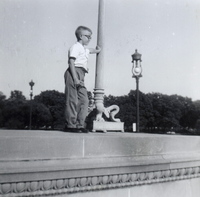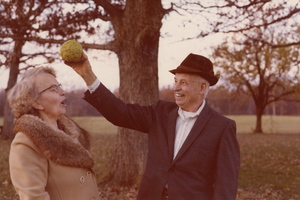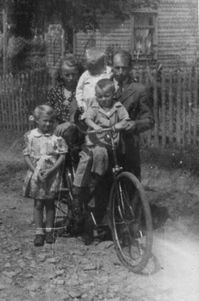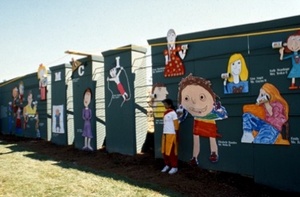| « Schakowsky Could Be Bluffing | Sen. Burris Celebrates 40 Years of Public Service » |
Chicago Tue Nov 10 2009
A Chicagoan reflects on the Iron Curtain
Jan Lorenc immigrated from a small town in southern Poland to Chicago's south side in 1962. Despite his young age--8 years old--he remembers living behind the Iron Curtain and suddenly finding himself in a new place where his first memory is riding in a pink Cadillac convertible.
Lorenc is now a successful designer in Atlanta, running a 31-year-old business that he founded in Chicago in 1978. He's also my dad.
As the world celebrates the 20th anniversary of the fall of the Berlin Wall this week, I spoke to my dad about his memories of living in a country with one-party rule, moving to the United States, and watching Soviet tyranny dissolve.
 RL: You came to Chicago at the height of the Cold War. What was your first thought when you arrived in the U.S.?
RL: You came to Chicago at the height of the Cold War. What was your first thought when you arrived in the U.S.?
JL: For a kid of only 8, it was like landing on another planet. I didn't know the politics of either country, but understood instantly Chicago was much different than Poland. I left my little village on a truck with a tarp cover, and rode a steam engine train to Warsaw, where I took my first bath in a real bathtub [running water] and saw my first TV. In my village, I grew up in another century, another lifetime. But when I arrived in Chicago I was picked up in a pink Cadillac with power windows, and we drove on highways with lights alongside. My life underwent an amazing transformation.
RL: Your father had been to the U.S. for a short time before the whole family moved. Did he have any idea of what to expect?
JL: He had no idea what to expect. He came to the U.S. through the sponsorship of his sister, but, since she left Poland before he was born, he didn't know her at all. In the end, it was really his sister Tekla who assured him that all would be good. Still, coming to the U.S. was a huge risk.
 Like many other immigrants, my parents gave everything up to move. They took two cardboard suitcases and started afresh. My father was fed up with the changes to Poland after the war, when Stalin cracked down and your neighbors turned you in for saying something against the party. My father's 4 month imprisonment for buying a piece of leather was one of the last straws, and it took several years for them to get exit visas.
Like many other immigrants, my parents gave everything up to move. They took two cardboard suitcases and started afresh. My father was fed up with the changes to Poland after the war, when Stalin cracked down and your neighbors turned you in for saying something against the party. My father's 4 month imprisonment for buying a piece of leather was one of the last straws, and it took several years for them to get exit visas.
My parents had enormous bravery to leave the familiar behind for a world they did not know anything about. My father saved money from the short-term work he had on his first trip, and when my mother came my parents remained frugal so that within 3 years we bought our first house on the south side.
RL: Do you remember your mother's reaction to her new situation?
JL: I don't. I can only recall my own apprehensions and fears. It was traumatic. My mother was so devoted to my father, and knew how horrible the Polish police state was. She knew the U.S. would be wonderful place to raise the family. I suppose they focused on me since my brothers were already grown.
 My parents knew if they worked harder they would make more and save more for a good life and a good education for me. In Poland this was impossible unless you were in the party and kissed up to the system by turning in the non-participants. They came here at age 45 and were able to save for life and be debt-free. They saw America as a land of opportunity and freedom to start one's own business, something that was impossible in Poland, where you were always being watched.
My parents knew if they worked harder they would make more and save more for a good life and a good education for me. In Poland this was impossible unless you were in the party and kissed up to the system by turning in the non-participants. They came here at age 45 and were able to save for life and be debt-free. They saw America as a land of opportunity and freedom to start one's own business, something that was impossible in Poland, where you were always being watched.
RL: You went back to Poland a few years after you immigrated. What do you remember from your visit?
JL: If you haven't been there, you can't imagine the true physicality of the Iron Curtain. I saw the Iron Curtain when I returned to Poland at 15. I visited my brother in Warsaw and saw all kinds of propaganda billboards about the U.S., and met my sister-in-law's brother who was a pilot who trained the North Vietnamese how to use MIG fighters to bomb U.S. forces. I saw how the news was nothing more than government propaganda.
On my way back to Chicago I traveled through Berlin. It was an emotional experience. My brother dropped me off at the east-west border, and I took a train to the other side. There were desperate people at the train station who so badly wanted out. East Berlin even had a radio tower where you view the lights of the west--pretty torturous, I'd say.
I saw the prison that the Iron Curtain created, how it separted families. My brother was to meet us in the U.S. in 1964, but was unable to leave since he was given a state education. Then, he was to leave in 1979 for my wedding and was arrested taking a letter from someone at the airport. He finally left a year later in 1980, and stayed in the U.S. while his wife and two kids were kept in Poland till 1985.
RL: Did you watch President Reagan's speech in front of the Berlin Wall when he called on Gorbachev to tear it down?
JL: It was amazing. Reagan was a brave man to challenge the Soviets as he did. Some demonized his words, but my parents loved him and what he did to bring down the curtain. His challenges to Gorbachev were real, and they worked.
 RL: I remember being at an event with you right after the Wall fell. You had designed a wall comprised of enlarged children's drawings of people for an event put on by MCI. They arranged phones for American kids to call East German kids, and I, being 6, had a short chat with a kid who spoke better English than my nonexistent German. How do you remember that event?
RL: I remember being at an event with you right after the Wall fell. You had designed a wall comprised of enlarged children's drawings of people for an event put on by MCI. They arranged phones for American kids to call East German kids, and I, being 6, had a short chat with a kid who spoke better English than my nonexistent German. How do you remember that event?
JL: It was an amazing event called Wall to Wall. Even under communism, these East German kids spoke great English, and spoke to kids from Montgomery Elementary School [in Atlanta]. I'm not sure the kids on either side understood who the other side was, but there was joy in communication. There was no hatred for the greedy Americans or the commie Germans--they were just kids. We asked questions about their school classes and lives.
RL: How do people in Poland feel today about the "old days?"
JL: Young people embrace freedom and capitalism, but the generation who grew up in the 60s misses the Poland of the past. Many who benefited from the laziness and complacency of the system miss communism's cradle-to-grave care. Family members who benefitied from the communist system miss the good old days when you did not have to work to get a job because it was just given to you. You did not have to apply to college because you were told where you would go (if at all). If you were sick the doctor was in 24 hours a day so you could get a bag of pills whenever.
Even today my cousin works for a 24-hour state-run dental clinic, and often works the 1 AM shift to take care of those who just can't wait until 7 to get a cavity filled. She even commented once that she received a bottle of liquor as a "gift" for treatment. It was the same bottle she had given her doctor months before. There have been many changes since 1989, but bribery and many parts of the old system are still alive and well.
RL: Lots of people are talking about who would deserve a Nobel Peace Prize for the end of the Cold War. Who deserves the award most?
JL: There's no doubt Reagan would have deserved it, but also Solzhenitsyn for his literature and bringing out the truth about the gulags. Pope John Paul II who quietly kept the pressure on the Soviets in his own subtle way. The media for bringing out the truth, and Gorbachev for opening the curtain just a crack. It was people like the protesters of the Velvet Revolution and Lech Walesa who risked jail time and their lives. It took a long time and the efforts of many people to force the Soviet system to the point when the Wall fell. It definitely is a wonderful thing that it did.












Edee Baggett / November 10, 2009 11:38 PM
Thanks so much for sharing these insightful memories. Great article.